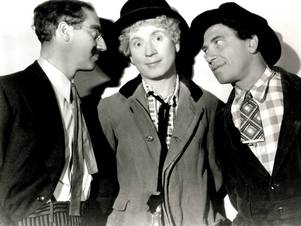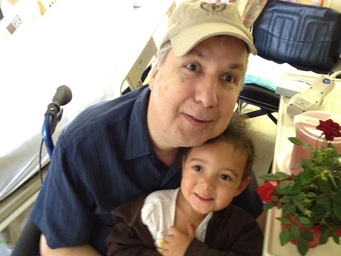 Generally speaking, falling down is funny. You don't even have to like the Marx brothers to think so. Physically, something in us relates, then we get embarrassed. We feel awkward and then we laugh - almost instinctively - whenever we see someone fall. No one really knows what to say to Pete after he falls but whatever they say, he usually responds with something like, "But I'm getting so good at falling." One time, I saw it happen from a distance. I had dropped him off at the curb to park the car. As I was walking up, I heard a few guys trying to help him up the steps. They took his walker before he had gotten close enough to reach the railing. So he stood there with nothing to hold onto, with very little balance and with this plan... I'll lean and reach for the railing. Something about Pete's nervous system is sticky. His brain's instructions to his legs travel through what seems to be elmer's glue. He reached and his legs didn't move, as if glued to the pavement. He reached probably five feet and began his descent, straight as a board. The message to his hands to reach out and break his fall also didn't make it through the glue and he landed. On his face. On a cement step. He rolled to the right... arm, elbow, hip, butt. His reaction - "well, let's see if we've got blood." My reaction - I used the F-word as both an adverb and an adjective (it's really a useful curse word if you think about it.) We happened to be going to a child's birthday party (enter my shame of using the F-word) and the oldest child heard that Pete had hurt himself - it looked like a bloody nose. She began to follow him around saying things like, "I had a bloody nose once; it hurts." or "You need to put peroxide on it. But that will burn. I don't like peroxide." adding "If it burns, you know that there's a cut there." and then repeat, "I had a bloody nose once; it hurts." This may sound irritating but it was the only words of sanity to be found. She lovingly stayed with us while we used up a box of tissues to find out what exactly was bleeding. She smiled and asked us if we would play Parcheesi when we were better. I don't remember the last time I played Parcheesi. Certainly, I wasn't married yet. I wasn't a mom yet. I wasn't a caregiver yet. I also think the last time I played Parcheesi, I didn't think that falling down was funny. Falling down hurt and my reaction to it was not to laugh but to cry. Sometime between then and now, the appropriate response of hurting and crying and disliking peroxide has turned into laughing. Instead of compassion and empathy, we awkwardly hide that we too have a propensity to fall down. Don't get me wrong... I have no judgment for others (and me still) who laugh at falling down. But after having been cared for by a child who clearly understood that falling down hurt, I'm beginning to question whether falling down is funny anymore. My apologies to the Marx brothers … and fast forward to this past weekend: A poem entitled Startled, I Wake  Julia and her PopPop Startled, I wake scared all of my mental faculties on high alert, readied with reason and fast response. He's on the floor, lodged between the bed and the electric wheelchair, a gift that has kept his falling to a minimum. “You won't fall if you're sitting down,” said his neurologist. He can't feel his legs, he doesn't have to tell me. They lie there, unmoving, slightly less colorful. I begin to move, holding his hands and propping him upright. He says, “I feel blood.” I turn on the lights, realizing that I didn't put my glasses on. I can't see anything. OK, I say. We'll check it out. First, let's get up onto the bed again. “I was going to the bathroom.” OK, we'll figure that out too. Bending legs first, Lift to kneeling position. “Can you do this with me? Yes, I think so. Up to stand, quickly twist to sit on the edge of the bed. When we fell asleep, he was so tired. Beyond tired. Not good. And his body was buzzing. His energy shaking the bed, I could feel it once I settled myself. His energy is calm now. Still tired, but not buzzing. Now he is tearful, dreading his dependence as I look for the source of blood. A gauge to his head – but once cleaned up more like a cut. A scrape on his arm, a ding to his ankle - the other ankle is still healing. His legs – they're discolored – and they alarm me. Clean wounds, we crawl under the covers together. Touching, soothing one another. He falls asleep first. Startled, he wakes me - needing help. my mental alertness is set to grace and mercy, not fear. Again, we crawl under the covers together, touching, soothing, sleeping. Startled, my cell phone wakes me the morning after. Two cups of coffee and breakfast, I sit alone on the couch, I listen for him to wake.
1 Comment
sarah louise
1/26/2013 03:18:17 am
How lovely to have a child that was alert to what was going on. Sending big cupcakes, Beth. You have a gift for taking the frustrating and making it into something artful.
Reply
Leave a Reply. |
What is this blog about?These are some of the reflections that I am fashioning into a memoir about coming to peace with my husband's diagnosis of multiple sclerosis.
|



